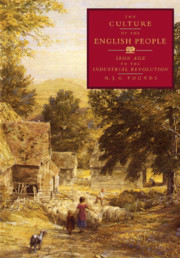Book contents
- Frontmatter
- Contents
- List of illustrations
- List of tables
- Preface
- List of abbreviations
- Map of traditional counties, with abbreviations, as used in this book
- Introduction
- 1 The view from Danebury
- 2 Roman interlude
- 3 House and household
- 4 Heat, light and insecurity
- 5 The house furnished
- 6 Food, its production, preservation and preparation
- 7 In sickness and in death
- 8 The community of parish and village
- 9 The family
- 10 The culture of cities
- 11 The foundations of popular culture
- 12 Conclusion: the end of popular culture
- Notes
- Index
12 - Conclusion: the end of popular culture
Published online by Cambridge University Press: 06 July 2010
- Frontmatter
- Contents
- List of illustrations
- List of tables
- Preface
- List of abbreviations
- Map of traditional counties, with abbreviations, as used in this book
- Introduction
- 1 The view from Danebury
- 2 Roman interlude
- 3 House and household
- 4 Heat, light and insecurity
- 5 The house furnished
- 6 Food, its production, preservation and preparation
- 7 In sickness and in death
- 8 The community of parish and village
- 9 The family
- 10 The culture of cities
- 11 The foundations of popular culture
- 12 Conclusion: the end of popular culture
- Notes
- Index
Summary
Modern man's originality, his newness in comparison with traditional societies, lies precisely in his determination to regard himself as a purely historical being, in his wish to live in a basically desacralized cosmos … his ideal no longer has anything in common with the Christian message, and … it is equally foreign to the image of himself conceived by the man of the traditional societies.
Mircea Eliade, Birth and RebirthTraditional society merged into modern at some indeterminate period in the eighteenth and nineteenth centuries. One cannot be precise to the decade or even the century. It did not result from the Industrial Revolution, though the Industrial Revolution was part of the transition. It did not consist only of material innovations, numerous and important though these were. It was marked by a change in mental attitudes to society and to the world; in short, by cultural change in its most profound sense.
This book has surveyed the ways in which popular culture in Britain has changed and developed during a period of more than two thousand years. This change has arisen from innovations which have been consciously adopted, used and diffused through at least some segment of society. Innovations have, very broadly, been of two kinds. First, there have been those which effected a fundamental change in the ways in which goods were made or people reacted to their environment. Each had long-term consequences, preparing the way for other innovations sometimes in very different fields.
- Type
- Chapter
- Information
- The Culture of the English PeopleIron Age to the Industrial Revolution, pp. 415 - 423Publisher: Cambridge University PressPrint publication year: 1994



